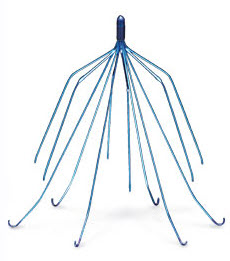The lawsuit was filed by Linda B., a woman who was implanted with the C.R. Bard Recovery® Vena Cava Filter on July 26, 2005 at a hospital in Pennsylvania.
Recovery is a 1.5-inch metal trap that is designed to sit in a major vein called the inferior vena cava (IVC) to prevent blood clots from traveling to the heart or lungs and causing severe injury or death.

Bard Recovery® IVC Filter
It is made of a nickel-titanium alloy called nitinol, unlike older stainless steel filters like the Greenfield. The filter’s metal legs (called “struts”) flex slightly as the vein pulsates with each heartbeat, breathing, and blood pressure.
Over time, this can lead to metal fatigue, strut fracture, and embolization — a complication that occurs when the needle-like struts break off and float in the bloodstream until they hit vital organs.
In 2003, Recovery became the first “retrievable” IVC filter to be approved in the U.S. by the FDA. It was allowed on the market without going through clinical trials because Bard claimed it was “equivalent” to two permanent IVC filters.
The plaintiff was implanted with a Recovery in 2005, the same year it was pulled off the market without a recall by C.R. Bard — just a few months after an internal report by Dr. John Lehmann found high rates of migration and fractures.
Her lawyers say Bard should have anticipated safety problems because the Recovery so closely resembled other problematic filters.
Evidence of a design flaw has been growing for years. In 2009, a small study found that all Recovery filters punctured the vein within 2.5 years, with high rates of fractures and migrations. The researchers warned:
Recovery filter limb perforation of the vena cava increases over time and is associated with a 21% incidence of filter arm fracture and migration. Follow-up imaging is recommended.”
More recent studies involving hundreds of patients estimate that the Recovery has a 40% 5.5-year fracture risk and a 25% risk of embolization of fractured pieces, with potentially life-threatening complications like cardiac tamponade.
In September 2015, an investigative report by NBC News found 27 deaths and over 300 injury reports involving the Recovery — and a possibly forged signature on its approval application.
Lawyers accuse C.R. Bard of selling a defective medical device, downplaying side effects, and inadequately alerting patients about health risks by removing Recovery from the market without a recall.
The lawsuit was filed on February 7, 2017 in the U.S. District Court for the District of Arizona — Case No. 2:17-cv-00388.
It will be centralized with over 1,360 other IVC filter lawsuits now pending against C.R. Bard in Multi-District Litigation (MDL No. 2641) — In Re: Bard IVC Filters Products Liability Litigation.
The plaintiff is represented by Ben C. Martin of The Law Offices of Ben C. Martin in Dallas, Texas. He serves on the plaintiffs’ steering committee of the Bard IVC Filter MDL.
 Editor’s note: For more information about IVC Filter lawsuits and your legal rights, please contact The Law Offices of Ben C. Martin.
Editor’s note: For more information about IVC Filter lawsuits and your legal rights, please contact The Law Offices of Ben C. Martin.

